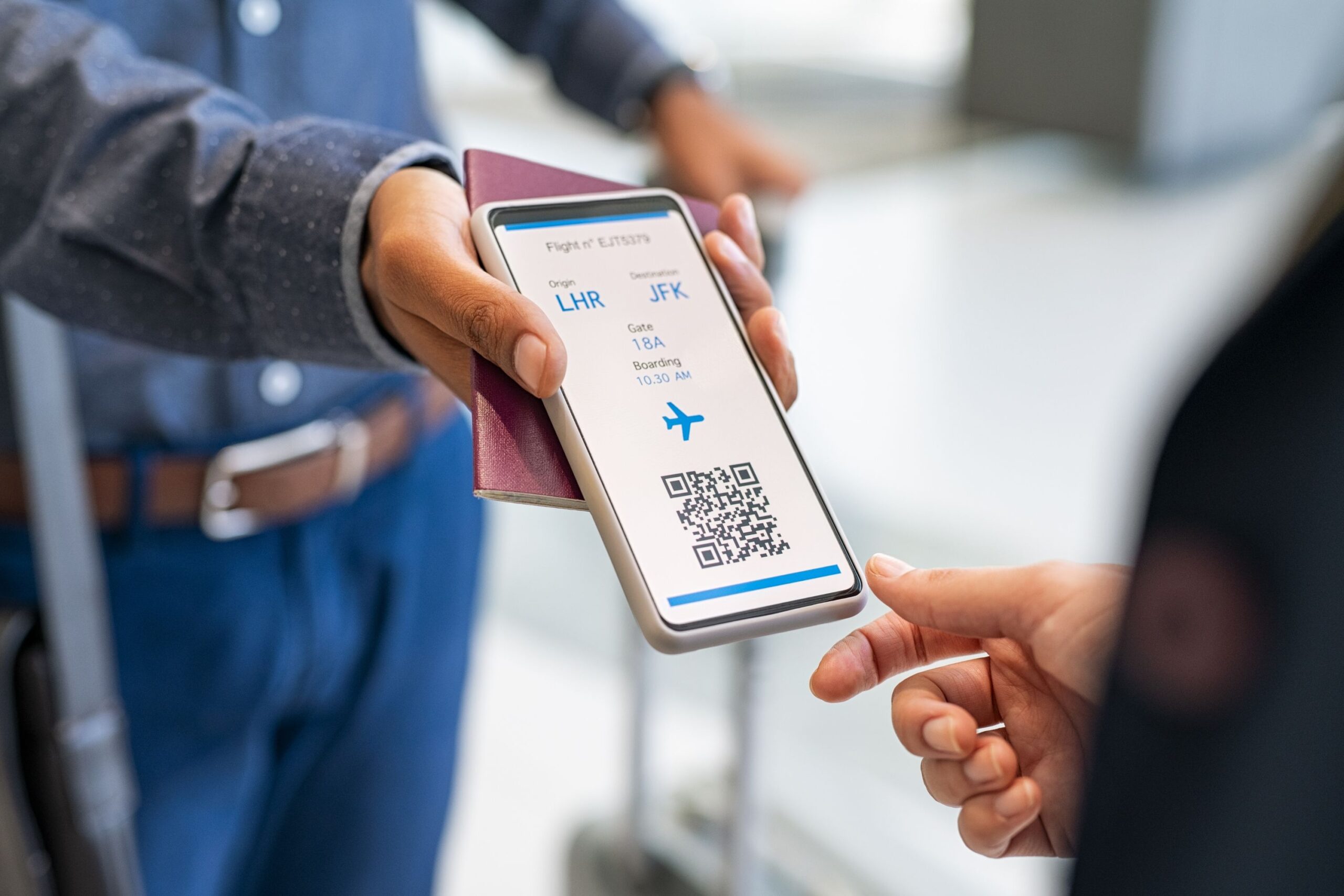If you’re getting ready to fly, is an e-ticket valid in airport check-in lines or at the gate? — The answer is yes. The e-ticket has become the standard form of airline ticket in nearly every country. Most airports around the world no longer require paper tickets. Your e-ticket holds all the necessary information for check-in, boarding, and security checks.
What changed is not just how we book flights, but how airlines operate. You used to have to guard a paper ticket like a passport. These days, all your travel details live safely in your email inbox or app. That convenience is part of why more people book flight tickets online than ever before.
Why Airlines Switched to E-Tickets
Airlines began phasing out paper tickets in favor of e-tickets in the early 2000s. The International Air Transport Association (IATA) pushed for a complete switch by 2008. Why? Because it’s faster, more secure, and significantly more cost-effective.
If you’ve booked your flight online, the airline automatically generates a digital record of your purchase. This electronic ticket includes your name, travel itinerary, fare details, seat selection (if applicable), and booking reference. There is no need to print anything unless you prefer to do so.
Airports adapted quickly. Check-in counters and kiosks are built to scan e-tickets from your smartphone or a printed confirmation. And airport security? They care more about your ID and boarding pass than the form your ticket was issued on.
What Makes an E-Ticket “Valid”?
An e-ticket is considered valid when it includes these three essentials:
- A unique booking reference (also known as a PNR)
- Passenger details matching a government-issued ID
- A confirmed flight itinerary issued by an official travel provider
As long as the name on your e-ticket matches the name on your passport or ID, and the flight details are confirmed, your digital ticket is ready to use. You won’t need a printed copy unless the airline or airport specifically asks for one, which is rare these days.
How to Use an E-Ticket at the Airport
Check-In
You can check in online 24 to 48 hours before your flight. After that, either show your mobile boarding pass or use a self-service kiosk to print one. In most airports, scanning the QR code on your phone is enough.
Security
At security checkpoints, you’ll need your government-issued ID and a boarding pass. Your e-ticket itself is usually not scanned, but the information from it is reflected in your boarding pass.
Boarding
At the gate, scan your mobile boarding pass one more time. It’s pulled directly from your e-ticket record, so there’s no need to show anything else unless asked.

junce, Canva.com
What If You Don’t Have a Printed Ticket?
Don’t stress. Airlines designed the e-ticket system to remove the need for physical documents. As long as you have your confirmation email or access to the airline’s app, you’re covered.
Still, if you’re someone who likes a backup, you can print your itinerary or boarding pass. However, keep in mind that the e-ticket is still the actual record, not the paper version.
Can You Book a Flight and Travel the Same Day?
Absolutely. E-tickets are generated instantly after payment. If you’re in a hurry and need to book flight tickets online for same-day travel, make sure you check in right after booking. Your e-ticket will be ready within minutes, and you’ll receive your boarding pass shortly after.
Are E-Tickets Accepted Everywhere?
For the vast majority of commercial flights, yes. Some tiny regional airlines or remote charter services may still use paper-based methods, but they’re the exception, not the rule. If you’re flying internationally, your e-ticket will usually be accepted at check-in and immigration.
However, if you’re flying through less-developed airports or countries with minimal tech infrastructure, you may want to double-check the airline’s policy.
What If You Lose Access to Your E-Ticket?
Say your phone dies. Or you accidentally delete the confirmation email. Don’t panic. Your flight is still booked.
- Use any self-check-in kiosk by entering your booking code or passport number.
- Head to the airline’s counter and give them your name and ID.
- Download the airline app in advance so your details are stored offline.
Once you’ve booked a flight online, the e-ticket is saved in the airline’s system. That means your seat and travel rights don’t vanish if your phone battery does.
Tips for Smooth E-Ticket Travel
- Save a copy offline: Take a screenshot of your boarding pass or save your e-ticket PDF before heading to the airport.
- Use airline apps: Most apps store your flight details and boarding pass for offline use.
- Double-check travel rules: If you’re flying internationally, confirm that the destination country accepts mobile boarding passes — most do.
- Charge your phone: It may sound basic, but displaying an e-ticket without a functioning screen can cause delays.
- Know your booking code: Write it down or memorize it for future reference. It helps if anything goes wrong.
E-Tickets and Airport Security: What You Need to Know
One of the most frequently asked questions by travelers is whether airport security will accept an e-ticket. The good news? Security checkpoints don’t require a paper ticket. They only care about your government-issued ID and a valid boarding pass.
So, where does the e-ticket come in? Your boarding pass is generated from it. Once you’ve checked in — either online or at a self-service machine — your boarding pass links back to your e-ticket details.
Instead, focus on keeping your ID and phone easily accessible. If you’re using a mobile boarding pass, ensure your screen brightness is set to maximum and the QR code is clearly visible.
Booking Flights Online with E-Tickets: What to Expect
If you’ve never used an e-ticket before, booking flights online might feel like a leap. But it’s faster and more flexible than using a travel agency or standing in line at the airport.
You’ll usually get a confirmation email within minutes. It’ll contain:
- Your name and booking reference
- Flight times and airport details
- Ticket number (that’s the e-ticket itself)
- Check-in options and baggage rules
Check in through the airline’s website or app 24 to 48 hours before departure. That check-in is the final step before your boarding pass appears.

Rido, Canva.com
When a Printed Ticket Might Still Be Useful
There are still a few rare instances where having a printed copy may be beneficial. If you’re flying from a remote airport or through a country with less developed tech systems, a printed version of your itinerary or boarding pass can speed things up.
Additionally, if you’re traveling with older relatives or someone who isn’t accustomed to smartphone screens, printed confirmations provide peace of mind.
What Airlines Recommend About E-Ticket Use
Most major airlines actively promote e-ticketing. Why? Because it reduces wait times, cuts costs, and eliminates paper waste.
Apps are helpful not just for boarding passes but also for flight updates, gate changes, and live check-in times. Some airlines also let you add your e-ticket to Apple Wallet or Google Pay.
How E-Tickets Improve International Travel
E-tickets aren’t just valid at the airport — they make flying between countries a lot easier.
If you have a connecting flight, there is no need to reissue your tickets. Your e-ticket covers every leg of the trip.
Visa applications often require proof of onward or return travel, and your e-ticket confirmation is the ideal solution.
What Happens if Your E-Ticket Doesn’t Work?
Let’s say you reach the airport, but your QR code isn’t scanning, or the kiosk doesn’t recognize your details.
Head to the airline’s check-in counter and explain the issue. Staff can look up your booking with your passport or ID and reissue your boarding pass.
Take a screenshot of your booking and boarding pass after check-in. That way, you’re covered even if the Wi-Fi cuts out or your app stops working.
Flying on Code-Share Flights: Does Your E-Ticket Still Work?
If you’re flying with one airline but your ticket says another, that’s a code-share flight. This happens frequently on international routes.
At the airport, go to the check-in desk or kiosk of the airline operating the plane. That’s who will issue your boarding pass and check your bags.
Check your confirmation email. It usually states “Operated by…” or includes both airline names.
How Low-Cost Airlines Handle E-Tickets
Budget airlines love simplicity. Most of them only use e-tickets. You’ll receive a short confirmation email with your booking number.
Many of these airlines charge extra to print anything at the airport. Always read the fine print before you fly.
Using Mobile Wallets for Airport Boarding
Digital wallets, such as Apple Wallet and Google Pay, have revolutionized travel. You can store your boarding pass in one place.
Mobile wallets store your boarding pass offline, so even in airplane mode, you’re still set.
Do You Need an E-Ticket for Every Passenger?
Yes. Every traveler, including infants flying on a parent’s lap, must have their own e-ticket. The system automatically generates a separate e-ticket number for each person.
When Should You Arrive at the Airport with an E-Ticket?
- Domestic flights: arrive at least 2 hours before departure.
- International trips: plan on at least 3 hours.
Online check-in speeds things up, but being early ensures you don’t miss the flight.
Are E-Tickets Safe for Airport Travel?
Yes. E-tickets are encrypted, secure, and tied to your ID. They’re often safer than paper tickets, which can be lost or stolen.
Save your boarding pass offline and keep your phone charged. Your email inbox or airline app becomes your most valuable travel document.
A Quick Recap Before You Fly
If you’ve ever wondered, “Is e-ticket valid in the airport?” — now you know: not only is it valid, it’s the global standard.
Once you’ve booked flight tickets online, your e-ticket unlocks everything from mobile check-in to gate access.
FAQs
What is the difference between an e-ticket and a boarding pass?
An e-ticket is your flight reservation. The boarding pass is issued after check-in and gives you access to the plane.
Can I show my e-ticket on my phone?
Yes. Most airports accept mobile e-tickets and boarding passes without any issues.
Do I need to print my e-ticket?
Usually, no. However, printing can be helpful in places with limited technology or if your phone battery is low.
Is an e-ticket enough to board the plane?
Not by itself. You also need a boarding pass and a valid ID. The e-ticket helps generate the boarding pass.
What happens if I delete my e-ticket email?
You can retrieve it through the airline’s website or app using your name and booking reference.
Can I use an e-ticket for international flights?
Yes. E-tickets are accepted for both domestic and international flights, provided they are issued by an official airline or travel provider.
How do I check in with an e-ticket?
You can check in online, at a self-service kiosk, or the airline desk using your booking reference or ID.




